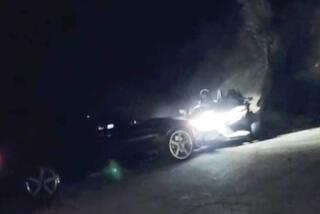Your Money : No Easy Fix for Auto Body Repair Fraud
- Share via
Fraud is rampant in the auto body repair industry. Relying on its own investigations and those of insurers, the Bureau of Automotive Repair said last week that body shops cheat on about 30% of repairs.
We asked members of the state’s Auto Body Repair Advisory Committee, a 12-member panel that assists the bureau, why fraud is so widespread. We got plenty of answers.
One law enforcement representative said insurance companies should take more responsibility. Insurance company representatives said regulators are indifferent. Collision technicians said a poor economy is tempting shop owners and consumers to fudge their invoices.
They’re all right--an indication of how complicated the problem is.
Deputy Los Angeles City Atty. Ruth Kwan, a committee member, said insurers too often don’t reinspect autos to make sure the repairs are proper.
“Insurance companies pay these claims based on estimates,” she said. “Very few go out and double-check the work when it is done to see, yes, indeed, it was done per contract.”
Insurers acknowledge that they do few reinspections. At State Farm, the state’s largest auto insurer, auditors in the Central California region--which includes most of Los Angeles County--reinspect 1% of completed repairs. Auditors review paperwork before choosing which cars to reinspect, and they uncover evidence of fraud in 70% of reinspections, said Stephen Booth, property claims superintendent.
Peter Bezeck, an Allstate claims manager and advisory committee member, said that although fraud is widespread, reinspecting large numbers of cars is not cost-effective for insurance companies. “The number of people it would take to do that, you just couldn’t do it,” he said.
Besides, he said, “we’re not in the business of enforcing laws.” Bezeck complained that until recently, the Bureau of Automotive Repair seemed unconcerned--it refused to accept tips about cheating from insurers.
That’s true, a bureau representative said.
“Our attitude was: They’re big corporations and we’re a consumer protection agency. We don’t take complaints from big companies and do their dirty work for them,” said Dan Povey, the bureau’s liaison to auto insurers. But “we’ve changed,” he added. “Fraud raises premiums . . . and we realized insurance companies have as much if not more information about the shops than we do.”
Povey said that in the 12 months ended June 30, the bureau took disciplinary action against 29 auto body shops, compared to five for the previous fiscal year. Many of those investigations were prompted by insurance companies. The bureau is making auto body repair fraud a priority, Povey said. Still, regulators lack the staff to investigate many cases, so there’s plenty of opportunity for cheating.
What about motive?
Orange County shop owner Rick Reiss, a committee member, said repair technicians are having a rough time financially because, in a slow economy, fewer cars get fixed. Desperation can push some technicians to, for instance, bang out a dented side panel but bill an insurance company for a new part.
Another committee member, San Bernardino shop owner Darrell Malott, said fraud also occurs when policyholders ask technicians to overstate repair costs in order to cover deductibles so the policyholders won’t have to pay them. Some technicians do it, he said, because they are afraid of losing the work: “It’s pretty hard to turn down a $5,000 job for a $100 deductible.”
What to do? The committee has called for legislation that would establish licensing and training standards for technicians as a first step toward solving the problem. It is far from certain that the Legislature would approve such a measure, however, since it would call for additional spending for administration at a time when lawmakers are under pressure to reduce state spending.
*
Running rings around the competition: An analysis of California arbitration filings released Thursday says General Motors’ Saturn unit appears to have the best record in resolving disputes over defects or repairs under warranty with new car owners.
The study, done by two consumer organizations, looked at the number of arbitration filings as a percentage of new car purchases in California last year.
The percentage of Saturn owners seeking arbitration was about 0.04%. The highest percentage, nearly 3%, belonged to Volkswagen owners.
Motor Voters and the California Public Interest Research Group, which released the survey, said the results indicate that Saturn is best at resolving disputes before they escalate into arbitration cases. Arbitration programs are monitored by the state Department of Consumer Affairs and are intended to resolve disputes without the expense of a lawsuit.






